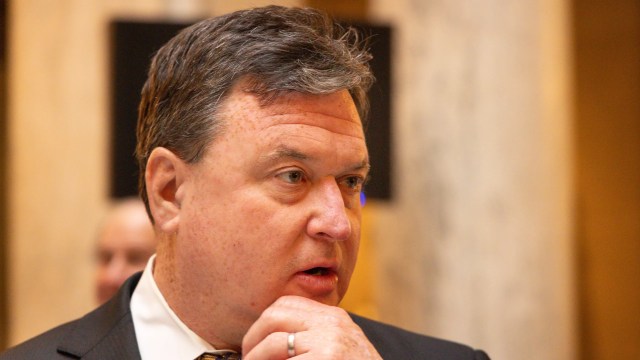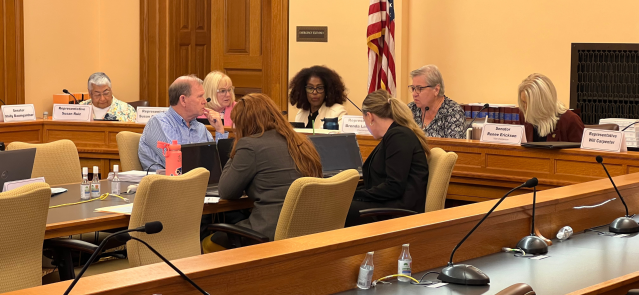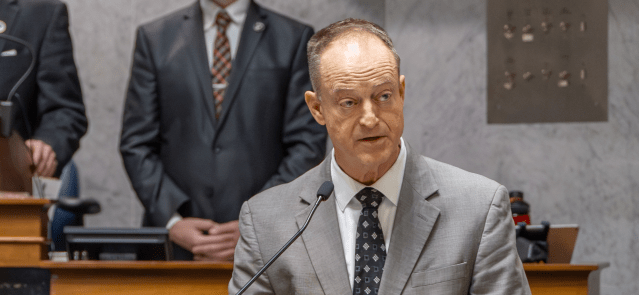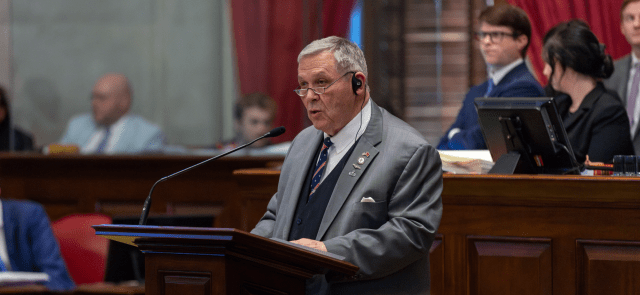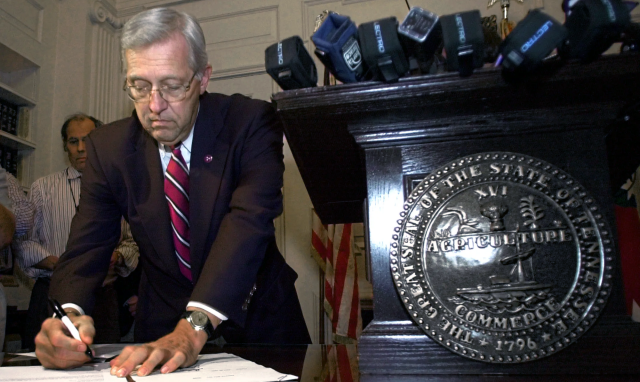Good morning!
Robert F. Kennedy Jr.’s name will remain on Indiana’s presidential ballot despite his announcement that he has suspended his independent campaign and endorsed Donald Trump, State Affairs reports. More news below. — Howey Politics Indiana/State Affairs
Kennedy remains on Indiana ballot despite suspending campaign: A noon Friday deadline passed without any voters filing a challenge to Robert F. Kennedy Jr. making the ballot by meeting the state’s petition signature requirement, according to the State Election Division. (Davies, State Affairs)
On the final night of the DNC, Harris shows who she is: After a head-spinning month, Democrat Kamala Harris became just the second offspring of American immigrants to claim a major party nomination. (Howey, State Affairs)
Election matchups 2024: Our elections spreadsheet lists all candidates who will be on Indiana’s general election ballot for federal and state offices, including the latest analysis of all contested races. Watch for updates from State Affairs on the horse races.
STATE
Indiana State Fair attendance jumps despite fewer days: Officials announced the fair drew 854,236 people over its 15-day run of fried food, farm animals, midway rides and entertainers. (Davies, State Affairs)
ISP names Mitchell as CFO: The Indiana State Police announced former state treasurer Kelly Mitchell is the agency’s new chief financial officer. (Mazurek, Inside Indiana Business)
Tomorrow: Medicaid committee to meet — A notice announced the Medicaid Oversight Committee will meet at 9 a.m. in Room 404 at the Statehouse. (Howey Politics Indiana/State Affairs)
Tomorrow: Roads task force to meet: The Funding Indiana’s Roads for A Stronger, Safer Tomorrow task force is scheduled to meet at 1 p.m. in Room 156A at the Statehouse. (Howey Politics Indiana/State Affairs)
Federal medical debt proposal would have significant impact in state: A national proposal to remove medical debt from consumer credit reports could have a significant impact in Indiana, where the percentage of residents with delinquent medical debt is higher than in 39 other states. (Orr, IBJ)
Questions as AES Indiana abandons coal: If all goes to schedule, the Petersburg Generating Station will convert to natural gas by the end of 2026, a conversion that will not significantly increase the plant’s production capacity, raising questions about the state’s increasing power needs. (Russell, IBJ)
Nippon Steel’s $15 billion takeover of U.S. Steel in peril: U.S. politicians from both parties have condemned the prospect that a storied 123-year-old American industrial company would be acquired by a foreign corporation. (The New York Times)
LOCAL
Indy council committee advances proposal to investigate Hogsett administration: An Indianapolis City-County Council committee voted unanimously to investigate allegations of abuse by members of Mayor Joe Hogsett’s administration and campaign. (Blanchard, MirrorIndy)
New advisory commission aims to improve quality of life for Carmel seniors: The Mayor’s Advisory Commission on Senior Living is designed to enhance the quality of life for Carmel’s older residents. (Shambaugh, The Current)
Lucas Oil Stadium, convention center anticipate big revenue jump next year: The Capital Improvement Board of Marion County anticipates a combined $235.8 million in tax and operating revenue next year, a 31% increase from its 2024 budget projection. (Shuey, IBJ)
GENERAL ASSEMBLY
Indiana Farm Bureau work on property taxes continues: At the recent Indiana Farm Bureau delegate session, water, rural broadband and property taxes were again top policy priorities. Taxes keep going higher, but farm income does not, according to Andy Tauer, INFB executive director of public policy. (Eubank, Hoosier Ag Today)
CONGRESS
Mrvan tours federal projects in Region: U.S. Rep. Frank Mrvan, D-Ind., announced he toured Michigan City Harbor, the Indiana Dunes National Park and the Ports of Indiana-Burns Harbor. A news release stated Mrvan helped to secure about $24 million in federal funding for the projects, with Burns Harbor seeking another $30 million in federal grants. (Howey Politics Indiana/State Affairs)
Spartz speaks at Texas energy forum: U.S. Rep. Victoria Spartz, R-Ind., traveled to Texas to be a guest speaker at the U.S. Energy Forum hosted at the Petroleum Club of Houston “to have a thoughtful conversation between the business community and policymakers on energy transition, stability, feasibility and sustainability,” according to a news release. (Howey Politics Indiana/State Affairs)
Congressional schedule: The Senate and House are out.
CAMPAIGNS
Republican candidates featured at Prescott Farms in Winchester: Senatorial candidate U.S. Rep. Jim Banks, R-Ind., lieutenant governor candidate Micah Beckwith, Secretary of State Diego Morales, state Sen. Jeff Raatz and state Rep. J.D. Prescott discussed various issues and pushed for continued GOP leadership in Indiana and the return of former president Donald Trump to the White House. (Cooney, The News Gazette)
McCormick tells Hartford City crowd ‘this is our moment’: Democratic candidate for governor Jennifer McCormick said her polling numbers look good but acknowledged there is a lot of work left to be done. (Cooney, The News Times).
Rainwater touts ‘better government’ at Posey County event: Libertarian gubernatorial candidate Donald Rainwater told attendees at the Posey County Cream the Candidate event that he is focusing on reforming property tax and getting rid of the state excise tax on gasoline. (Newland & Blackmarr, WEHT-TV)
GOP caucus to replace Messmer set for Sept. 4: Indiana Republican Party Chairman Randy Head called a caucus to fill the vacancy in state Senate District 48. The event to replace Sen. Mark Messmer, R-Jasper, will begin at 7 p.m. at the Jasper High School Auditorium, 1600 St. Charles St. (Howey Daily Wire/State Affairs)
St. Joseph County GOP books private screening for Reagan biopic opening: The St. Joseph County Republican Party has booked a theater for a private screening of “Reagan” at Cinemark Movies 14 in Mishawaka on Thursday at 7 p.m. Advance tickets are $15. (Parrott, WVPE-FM)
Report: How Indiana University students vote — IU students showed up in record numbers during the 2020 election, overwhelmingly favoring Joe Biden (82.68%), but both voter turnout and registration among IU students has waned in the years since. (Rosenzweig, The Herald-Times)
PRESIDENTIAL 2024
Trump pledges to be ‘great for women and their reproductive rights’: Donald Trump attempted to strike a new tone on the issue of abortion, saying he would be “great for women and their reproductive rights” — to the frustration of anti-abortion advocates. (Politico)
Pence concerned with Trump’s comments on reproductive rights: Former Vice President Mike Pence said “Republicans should embrace the language of life, not the language of those who support abortion on demand.” (National Review)
818K jobs correction a problem for Harris: The federal government routinely revises economic data, but it rarely makes a correction as large as it did when the Bureau of Labor Statistics reported America’s economy created 818,000 fewer jobs than it initially thought over the past year. (CNN)
Hill Democrats try to tamp down backlash to Harris’ grocery price gouging pitch: Under pressure to defend Kamala Harris’ grocery price gouging plan, some Democratic lawmakers are delivering a quiet message to anxious allies: Don’t worry about the details. It’s never going to pass Congress. (Politico)
NATION
Oil rises as Israeli strikes on Lebanon put Middle East on edge: Oil advanced as the Middle East braced for escalating conflict after Israel launched a pre-emptive strike on Hezbollah targets in southern Lebanon. (Bloomberg)
White House schedule: President Joe Biden will receive the Daily Brief in the morning. Vice President Kamala Harris will receive briefings and conduct internal meetings with staff.
SUNDAY TALK
Vance: Trump would veto federal abortion ban if bill comes across desk — GOP vice presidential nominee Ohio Sen. JD Vance vowed that former President Trump would not impose a federal abortion ban if re-elected to the Oval Office, adding that Trump would veto such a measure if it were to come across his desk. (Fox)
Cotton: Presidential race will ‘be a close race’ — Republican Sen. Tom Cotton, an ally of Donald Trump, said the presidential race will be a close one and the former president will put in the work to win in November. (ABC)
Sanders: ‘Rough’ campaign ahead but Harris has ‘very good chance to win’ — Two-time presidential candidate Sen. Bernie Sanders predicted the campaign ahead will be “rough” but said he believes Vice President Kamala Harris “has a very good chance to win” the presidential election. (ABC)

